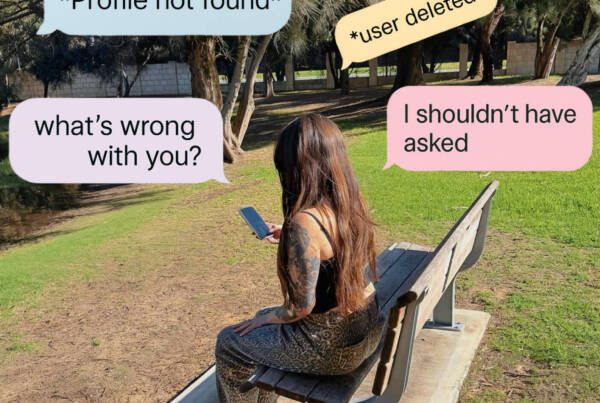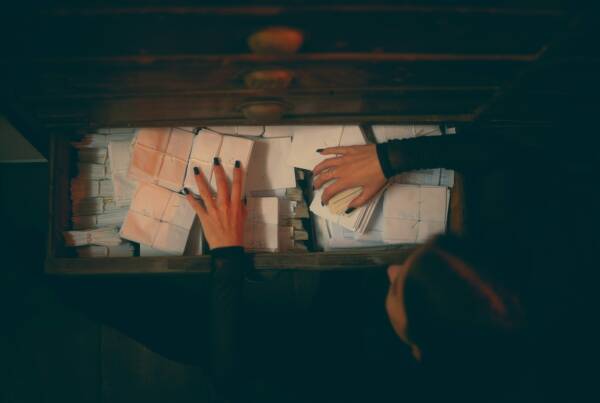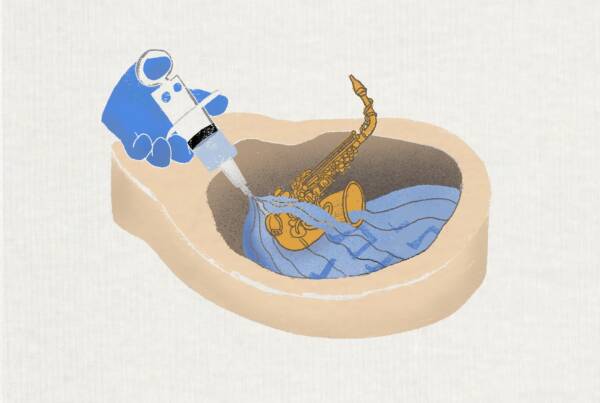Interview of Calliste Weitenberg by Freya Bennett
 Walkley Award winner Calliste Weitenberg investigates the state of Romania’s booming adult camgirl industry. Webcam studio owners say the business is perfectly legal and are fighting to prove their legitimacy, but following the arrest of US-born influencer, Andrew Tate, who ran a webcam company in Romania, the industry is facing new scrutiny for sex trafficking. Dateline explores the experiences of women working for the industry and uncovers a wild west of “ghost studios” with few rules and even less oversight.
Walkley Award winner Calliste Weitenberg investigates the state of Romania’s booming adult camgirl industry. Webcam studio owners say the business is perfectly legal and are fighting to prove their legitimacy, but following the arrest of US-born influencer, Andrew Tate, who ran a webcam company in Romania, the industry is facing new scrutiny for sex trafficking. Dateline explores the experiences of women working for the industry and uncovers a wild west of “ghost studios” with few rules and even less oversight.
Why is now the time to talk about the story of Romania’s webcam girls?
The world is waiting for the trial of online influencer and self-proclaimed misogynist Andrew Tate to begin. He’s facing charges of human trafficking, sexual abuse and rape after running his own adult cam business in Romania. While the trial date hasn’t been set, just last week a court extended restrictions stipulating Tate may not leave the country. I wanted to take a look behind the scenes at the industry he claims has made him so much money (Tate himself has boasted of having made $US600,000 a month at the height of his “cam empire”). Turns out, Romania’s cam industry has never been bigger and is growing at a substantial rate. The country’s authorities have suggested there are around 5000 women employed in the industry now (although it’s impossible to verify where or how they get that figure since there’s no official business code for the industry with Romania’s tax office). And big studios are pushing for legitimacy. No one had done a proper investigation into where Romania’s industry (beyond Andrew Tate) is at. So that’s what we did.
What are the main challenges faced by camgirls operating within this industry, particularly regarding regulation and safety?
The industry is still a Wild Wild West and almost totally unregulated. There is very little government or police oversight. At the same time, the industry has never been bigger and online advertising targeting young people (particularly women) is everywhere. You can stop any second girl in Bucharest (we did) and they’ll tell you they have been targeted by cam studios seeking models online. So it’s incredibly hard for (particularly young) girls to navigate this space safely. On one side, there is a push by some big studios for more legitimacy and greater transparency (they’re cleaner, classier, often run by women for women, with employment contracts, benefits and who also pay taxes). But, for every legitimate studio there’s countless illegitimate, illegal studios, where girls are employed off the books in unregistered, clandestine businesses. And for a girl just starting out, it can be hard to tell the difference before it’s too late. We investigated one fake business who was falsely recruiting online for PC operators using the Amazon logo without its permission, to lure girls into webchat. So it remains such a murky space. Former cam girls we spoke to for our investigation say that abuse and coercive control is rife at many studios, causing many models to break their boundaries. We spoke to several former cam girls who said “meetups” (where cam girls are made to have sex with clients in person, often against their will) is common. What’s also becoming clear, particularly in the wake of the Tate case, is that there is a potential widespread link between the cam industry and cases of human trafficking.
How do studio owners navigate the legal and ethical boundaries within this industry, considering the prevalence of “ghost studios” with minimal oversight?
It’s fascinating because it’s a very murky space. Firstly, the big studios who are pushing for greater transparency and legitimacy say they give more control and autonomy to the girls. That it’s great because the girls decide what they want to do and don’t want to do on camera, from the safety of a private room, and that they decide the working hours they do. They also say they employ girls through copyright contracts and pay taxes, health care etc. They say they also provide girls with “trainers” who are third parties, often former cam models themselves, who act as a kind of guardian in online interactions with users when a girl is just starting out online (the intent being they help manage interactions with users and push back against aggressive demands). At one studio we filmed, Models4Models, which is owned and operated by a former cam girl, these did seem like genuine attempts to bring the industry out of the shadows and help balance the power between model and manager. However, none of this is actually enforced or checked by authorities. So, the culture can vary widely from studio to studio as it’s entirely dependent on the will of the manager and owner. By and large, studio owners and managers are still men. Many cam girls say they have experienced manipulation, threats and abuse, and can be coerced into breaking their boundaries.
Another fascinating element is the 3 way interaction between users , models and so called “chatters”. Chatters are 3rd parties employed to type on behalf of models (often poorer, uneducated models, who are unable to speak English) during live streams – while the chatters are meant to honour the wishes of the model, several models told us it’s common for chatters to accept user demands and pressure models into doing things they may not wish to do. Considering the precarious financial situation of many young models, the ethics are of this 3 way arrangement seem questionable. So it’s definitely a murky space.
What impact has Andrew Tate’s arrest and subsequent human trafficking case had on the perception and operation of the Romanian webcam industry?
Generally speaking, it’s helped to shed light on the darker sides of this industry, that to date, hasn’t received any real scrutiny at all. There is a lot of work being done by Romania’s anti-trafficking experts and campaigners around raising the awareness and education of young people, especially as they are the ones being targeted by the cam industry. They’re going into high schools and universities to have these discussions.
The case has also helped to show just how big the industry has become and how much money is being made by managers and studio owners . But practically, in terms of how the industry actually operates, sadly not much has changed at all at this point. At the moment, studios only seem to pay tax based off the good will and intentions of the owner. Beyond the Tate case, there have been no significant law changes or substantial police crackdowns. One of Romania’s leading human trafficking lawyers, Dr. Silvia Maria Tăbușcă, who has been investigating the Tate case, says there’s no true knowledge of the scale of the problem (connection between web cam industry and trafficking) in the country because authorities just haven’t looked into it until now. This is despite the country being known as a major source country in the EU for sex trafficking and other trafficking cases connected to camming coming to light. I’ve also been told that Romania’s anti-trafficking units, obligatory under the EU’s Anti-Trafficking Convention, are still too small, too underfunded and too busy to enact the kinds of comprehensive investigations needed to make a dint in this industry.
How do societal attitudes and cultural norms in Romania influence the perception and acceptance of adult webcam work?
Despite how big the cam girl industry has become, paradoxically, Romania remains culturally very conservative. Romania is one of the most religious countries in the EU and the majority of its citizens are Orthodox Christians. So this has huge flow on effects. Sex cam work is still (I would say falsely) perceived as something morally wrong and so, it’s considered mightily taboo by mainstream society. So you will find that it’s not advertised openly on Romanian TV or billboards. (Some studios told me they would receive enormous backlash from the public when they advertised openly. So the industry gets around this now using social media algorithms to target girls and users directly, and more discreetly, online).
Most cam girls in Romania have experienced doxxing and online abuse and harassment, threats of being outed to their friends and family. This is why most of Romania’s cam girls will only work for overseas users (in English speaking countries like the US, UK, Australia etc) and block their accounts to Romanian viewers for fear of backlash.
Another effect of this is that many girls who work in the industry do it without the knowledge of their friends or family, often even their husbands can be unaware they are a cam girl. This is a big thing the studios capitalise on – they provide private spaces where women (who often have too little income to rent other spaces) can do this work. Even the studios themselves are often un-indentifiable from the street, hidden in non-descript apartment buildings.
The fact the industry is still so taboo is also a big reason many girls experience coercive abuse – it’s used as leverage to force them to break their boundaries and do things they may not want to do, for fear of being “outed”.
Romania’s cultural conservatism is also a big reason politics hasn’t moved to truly reform the industry (in light of recent revelations of its ties to human trafficking). Because as a politician, any reform would be seen as an attempt to legitimise the industry and therefore, is considered political suicide.
In what ways, if any, does the Romanian webcam industry intersect with broader discussions about gender, power dynamics, and exploitation within the realm of sex work?
I think it’s a perfect example of the ongoing fight for legitimacy that’s being waged by sex workers all around the world in order to work safely. Safety is very dependent on transparency. But transparency is dependent on achieving a broader cultural acceptance of sex work and the eradication of societal taboos. None of this seems achievable while discussions around gender and power are still so plagued by misogyny, discrimination and violence against women. And so, unfortunately, exploitation is still the end result.
 Tune into Romania’s Webcam Girls on Dateline this Tuesday at 9.30pm on SBS and SBS On Demand.
Tune into Romania’s Webcam Girls on Dateline this Tuesday at 9.30pm on SBS and SBS On Demand.






